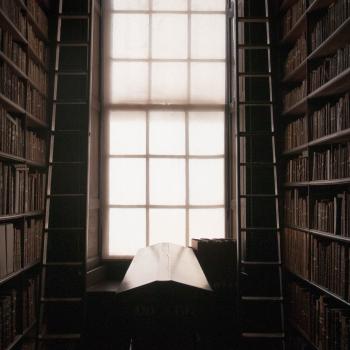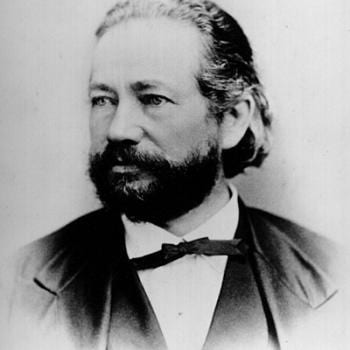
It feels like ages ago, but just this past January, the preeminent conservative philosopher and greatest Englishman of his generation, Roger Scruton passed away. A bad omen, it turns out, for 2020. Excellent tributes to his life, which poured in from around the world, can be found here and here.
Before his death, Sir Roger agreed to set up the recently launched Roger Scruton Legacy Foundation. The inaugural event, a webinar (such are the times), is taking place tomorrow (which I will attempt to live-blog here at TCC) for the purpose of reflecting on Scruton’s life and intellectual contribution. The webinar will be led by Douglas Murray of the Spectator and Roger Kimball of the New Criterion—you really must read Kimball’s 1991 New York Times review (“An Assault on Mush”) of Scruton’s collection of essays entitled, The Philosopher of Dover Beach. What follows is a brief reflection on Scruton’s great awakening, his adoption of the conservative disposition. Looking to the legacy of Roger Scruton and his enduring relevance for our times, this seemed like as good a place as any to start, at the beginning. The chief lesson included below, one that should provide some comfort to us, is that chaos creates conservatives, and hopefully the newly minted conservatives that emerge from the ashes of the present cultural and political chaos will be conservatives like Roger Scruton.
Conservative origin stories often feature chaos as the catalyst. Perhaps surprisingly, then, conservatives—at least those who sprout up in an intellectual environment where some brand of liberalism is the accepted wisdom— are, in a sense, reactionaries at the start.
Writing in 2003 for the New Criterion, Scruton described witnessing riots in 1968 Paris (a pivotal moment he recalled often), but it could have just easily been written in 2020 Minneapolis or Portland (or, now, Kenosha):
In the narrow street below my window the students were shouting and smashing. The plate-glass windows of the shops appeared to step back, shudder for a second, and then give up the ghost, as the reflections suddenly left them and they slid in jagged fragments to the ground. Cars rose into the air and landed on their sides, their juices flowing from unseen wounds. The air was filled with triumphant shouts, as one by one lamp-posts and bollards were uprooted and piled on the tarmac, to form a barricade against the next van-load of policemen.
He further recounted how demonstrators threw rocks at policeman and how one in particular who was hit head on “rolled over on the ground clutching his face, from which the blood streamed through tightly clenched fingers.” It was that day that Scruton knew he was “on the other side.”
What I saw was an unruly mob of self-indulgent middle-class hooligans. When I asked my friends what they wanted, what were they trying to achieve, all I got back was this ludicrous Marxist gobbledegook. I was disgusted by it.
By the time he had taken a lectureship at Birkbeck— where he would in no time at all be berated and ostracized for the high crime of intellectual heterodoxy (“My failure to conceal my conservative beliefs was both noticed and disapproved of…”)— a couple of years later, Sir Roger had become a professing conservative. “I knew I wanted to conserve things rather than pull them do,” he once explained to the Guardian. Only later did he formulate philosophical explanation to support his disposition acquired on the continent.
More intriguingly, Scruton also described the subsequent euphoria of a friend who had spent the day protesting in ’68: “She was very excited by the events… Great victories had been scored: policemen injured, cars set alight, slogans chanted, graffiti daubed. The bourgeoisie were on the run and soon the Old Fascist [de Gaulle] and his régime would be begging for mercy.”
In the same encounter, the self-described naïve, young philosopher posed an earnest question to his interluctor: “What, I asked, do you propose to put in the place of this “bourgeoisie” whom you so despise, and to whom you owe the freedom and prosperity that enable you to play on your toy barricades?”
She replied with a book: Foucault’s [The Order of Things], the bible of the soixante-huitards [the student protestors], the text which seemed to justify every form of transgression, by showing that obedience is merely defeat. It is an artful book, composed with a satanic mendacity, selectively appropriating facts in order to show that culture and knowledge are nothing but the “discourses” of power. The book is not a work of philosophy but an exercise in rhetoric. Its goal is subversion, not truth, and it is careful to argue—by the old nominalist sleight of hand that was surely invented by the Father of Lies—that “truth” requires inverted commas, that it changes from epoch to epoch, and is tied to the form of consciousness, the “episteme,” imposed by the class which profits from its propagation. The revolutionary spirit, which searches the world for things to hate, has found in Foucault a new literary formula. Look everywhere for power, he tells his readers, and you will find it. Where there is power there is oppression. And where there is oppression there is the right to destroy. In the street below my window was the translation of that message into deeds.
Here, the greatest conservative thinker of his generation demonstrates his greatness: the ability to cut to the chase without dipping into caricature; and the wit to articulate the emotion as much as the thought that every sensible person has reading such drivel—albeit monumental, highly influential drivel. Whilst criticizing his opponents, Scruton almost always conveyed a sympathy for them that is hard to describe (see especially his chapter on Sartre in Fools, Frauds, and Firebrands).
Though Foucault is long dead, Scruton notes well his outsized, enduring legacy, solidified in seemingly every university reading list in Europe and America. “His vision of European culture as the institutionalized form of oppressive power is taught everywhere as gospel, to students who have neither the culture nor the religion to resist it.” This is surely attested to by the dominance by critical theories of the public discourse at the moment— the dam of university quad walls finally being breached— recounted well by the new must-read book, Cynical Theories, by James Lindsay and Helen Pluckrose. (See also Murray’s Madness of Crowds).
For the young Scruton, the antidote to Foucault was the Anglo-American common law tradition, a love for which he cultivated whilst studying for the bar. “Law,” he said, “is constrained at every point by reality, and utopian visions have no place in it.”
Moreover, the common law of England is proof that there is a real distinction between legitimate and illegitimate power, that power can exist without oppression, and that authority is a living force in human conduct. English law, I discovered, is the answer to Foucault.
The second line of defense against those radicalized by Foucault was found, for Scruton, in Edmund Burke:
When I first read Burke’s account of the French Revolution I was inclined to accept, since I knew no other, the liberal humanist view of the Revolution as a triumph of freedom over oppression, a liberation of a people from the yoke of absolute power. Although there were excesses—and no honest historian had ever denied this—the official humanist view was that they should be seen in retrospect as the birth-pangs of a new order, which would offer a model of popular sovereignty to the world. I therefore assumed that Burke’s early doubts—expressed, remember, when the Revolution was in its very first infancy, and the King had not yet been executed nor the Terror begun—were simply alarmist reactions to an ill-understood event.
Here’s some countercultural insights on the nature of authority:
Far from being the evil and obnoxious thing that my contemporaries held it to be, authority was, for Burke, the root of political order. Society, he argued, is not held together by the abstract rights of the citizen, as the French Revolutionaries supposed. It is held together by authority—by which is meant the right to obedience, rather than the mere power to compel it. And obedience, in its turn, is the prime virtue of political beings, the disposition which makes it possible to govern them, and without which societies crumble into ‘the dust and powder of individuality’… In effect Burke was upholding the old view of man in society, as subject of a sovereign, against the new view of him, as citizen of a state… Real freedom, concrete freedom, the freedom that can actually be defined, claimed, and granted, was not the opposite of obedience but its other side. The abstract, unreal freedom of the liberal intellect was really nothing more than childish disobedience, amplified into anarchy.
Scruton remembers fondly:
Those ideas exhilarated me, since they made sense of what I had seen in 1968. But when I expressed them, in a book published in 1979 as The Meaning of Conservatism, I blighted what remained of my academic career.
And the rest is history (and the rest of us are better for it). Though his getting the boot from academia must have stung in the moment, Roger Scruton’s legacy was defined by it. He understood cancel culture before most of his admirers (including myself) were born. I, for one, am glad he was banished from the ivory tower by the Star Chamber of academia, never to be truly readmitted. Otherwise, we might not have received the same blessings from his pen. His professional banishment was his intellectual liberation.
In the same essay, Scruton goes on to express his adoration for Burke’s “subtle defense of tradition, prejudice, and custom, against the enlightened plans of the reformers”—with “tradition” standing for “a constantly evolving, yet continuous thing, which is remade with every addition to it, and which adapts the past to the present and the present to the past,” and by “prejudice” meaning “the set of beliefs and ideas that arise instinctively in social beings, and which reflect the root experiences of social life.” Burke’s replacement of Rousseau’s social contract with a social trust (between the living, dead, and yet to be born) is the final piece of Burke that Scruton integrated into his own formulation of conservatism. Indeed, respect for the dead was, in Burke’s view, the only real safeguard that the unborn could obtain, in a world that gave all its privileges to the living.”
Rousseau placed the presently living members of society in the driver’s seat (in “dictatorial dominance over those who went before and those who came after them”), which led to a squandering of cultural and historical resources and knowledge, a “cultural and ecological vandalism” or what Andrew Doyle recently called “revisionist vandalism.” Burke (and Scruton) were disgusted by it, for it violated the social trust. Under the Scrutonian view, societal overhaul is not in the cards; it is tantamount to robbery, or at least tortious conversion. For Sir Roger, “Burke summarized all my instinctive doubts about the cry for liberation, all my hesitations about progress and about the unscrupulous belief in the future that has dominated and perverted modern politics.” The conservative, then, is naturally pessimistic about such efforts. But this pessimism is fostered only by experience, that is, observing the futile attempts at societal planning in service to the god of progress, with desperate longing for the advent of modern man.
We have, of course, seen ourselves of late the most acute manifestation of “cultural and ecological vandalism.” A cursory search of the internet or one’s Twitter feed will reveal the desecration of property and the destruction of historical memory— along with the assertion of a counter hegemony in the form of cultural initiatives like the Pulitzer-winning 1619 Project— all in the name of the marginalized but without the consent of the most vulnerable members of our society: the dead and those not yet living.
And regrettably even the party that ostensibly (but seldom substantiated) champions of the life and interests of the unborn have done precious little to allay the effects of present civil unrest. Perhaps it will all blow over as many of them seem to hope (for the sake of the security of their respective reelection campaigns, no doubt). But, at what cost in the meantime?
***
Scruton’s record leaves no room for doubt that he would have been up to whatever challenge faces western civilization. His final speech makes this clear. But one cannot help but see his death, in hindsight, as a gracious act of providence— for him if not for us— so that he did not have to witness a near verbatim reenactment of that which he recoiled from in his conversion moment.
Revolutionary (even violent) impulses coupled with evangelistic fervor and justified by the intelligentsia’s half-baked revisionist Marxism is nothing new, nothing that would have surprised Sir Roger, who had faced down an actually oppressive regime in the Visegrád countries. The reemergence of what Rod Dreher rightly refers to as soft-totalitarianism, having so much in common with the Soviet milieu, would not have caught Scruton off guard. Unlike so many so-called (but ill-learned) intellectuals, he would have known, by reason and experience, exactly what he was looking at.
But what is seemingly unprecedented about the present moment in the West is not any of these trends, the ebb and flow of which is a constant in free society, as Ryszard Legutko has shown us—as is the drift toward totalitarianism. Rather what is demoralizing for the Scrutonian project— maybe even more so to his successors who attempt to carry on his legacy, transmitting his thought to a new generation— is the complete and utter assault upon the societal, inter-generational trust, the genocide of the dead and the not yet born by the hubris of the living; the return of Rosseau in all his hideous strength— his pagan millennialism and arid presentism. The West now despairs of itself, caught up in a perpetual spiral of regret and apology for its own existence, and thereby assuring its eventual demise by cutting itself off from its progeny. The Scrutonian diagnosis of the situation would be a severe case of late onset, rapidly metastasizing, oikophobia. That is, for the moment, Scruton’s enemy appears to be enjoying triumph.
***
The question that remains is whether this triumph is owed to an insular battle or the entire war; whether the decline of the West from within is a reparable setback— a hard-learned lesson— or the beginning of the end. In either case, the innumerable disciples of Scruton will doubtless—else they would not be Scrutonians—want to carry on. If there was anytime to breath deep the legacy of Scruton anew it is now. It may represent a last hope of renewal.
The best way to honor said legacy is, like monks of the Clonmacnoise, to preserve the wisdom of the dead through the gathering— or perhaps now already upon us— storm to be transmitted to the not-yet-born. And though, being naturally averse to chaos, we might long for the calm and seclusion of Scrutopia, the task before us is urgent, our enemies unrelenting. In truth, the former lord of Scrutopia may have enjoyed some measure of physical seclusion in his later years, but, ’til the end, never secluded his mind— else he would not have remained such a favorite object of derision for his anti-fans at the New Statesman. In some ways— if Scruton’s own origin story is any indication— may be easier than expected right now. The law that chaos creates conservatives— a law attested to also by the stories of people on this side of the pond like Thomas Sowell and Clarence Thomas— suggests this
Scruton’s project, in brief, was describing and cultivating the conservative disposition. For him (as with Oakshott and Kirk), conservatism is not political credo in the first instance “but a lasting vision of human society.” The pleasant biproduct of articulating this vision was the giving voice by proxy to the natural, inborn impulses of ordinary people. As he famously said in How to Be a Conservative, “Conservatism starts from a sentiment that all mature people can readily share: the sentiment that good things are easily destroyed, but not easily created.” Doubtless the ordinary but ignored people of all countries that are the being ravaged by the critical social justice scourge (which Scruton knew well) recognize, or are briskly coming to the realization of, this truth. He has left us the antidote(s) to the present chaos, the pandemic of oikophobia, and the assault upon the inter-generational trust. All that is left is for us to mine them.
Acknowledging the difficulty of his self-appointed task, Scruton, the patron saint of pessimists, nevertheless did not despair, “since experience has taught me that men and women can flee from the truth only for so long, that they will always, in the end, be reminded of the permanent values, and that the dreams of liberty, equality, and fraternity will excite them only in the short-term.” One of the last essays he wrote in December 2019, reflecting on the tumultuous prior 11 months of undeserved and unsubstantiated public ridicule and declining health, perfectly illustrates the dogged refusal of Wordsworth’s happy warrior to despair.
Let’s hope, for our sake, he was right and that, for his sake, we can be as hopeful. “This is the happy Warrior; this is he/That every man in arms should wish to be.”
Image: Roger Scruton, lecturing in Budapest on September 19, 2016 (Wikimedia Commons)












